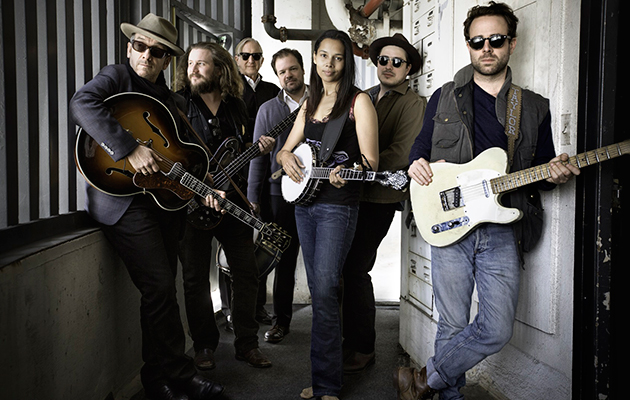Best known for his Wilco documentary I Am Trying To Break Your Heart, Sam Jones is a filmmaker who combines an artist’s eye – his photographic portraits of such as Obama, Dylan, Clooney and Nicholson have made various high-end magazine covers – with a peculiar sensitivity to the artistic proc...
Best known for his Wilco documentary I Am Trying To Break Your Heart, Sam Jones is a filmmaker who combines an artist’s eye – his photographic portraits of such as Obama, Dylan, Clooney and Nicholson have made various high-end magazine covers – with a peculiar sensitivity to the artistic process. The right choice, then, to helm this documentary bridging the recent recording of unrecorded Dylan lyrics from 1967 with the original Basement Tapes.
In documentaries, access is everything, and Jones has the ultimate access coup in Dylan himself, albeit not onscreen: his voiceovers, however, are some of the most fascinating parts of the film, revealing the headline inspiration for songs like “Tears Of Rage” and “Too Much Of Nothing”. At first, it seems that Jones also has access to a time-machine, with the modern studio scenes intercut with gauzy footage of what appears to be Dylan and The Band wandering through the trees in Woodstock, riding bikes on the lawn of Big Pink, and even doing a tightly-synced run through “Apple Suckling Tree” in the basement. But of course it’s just actors, chosen for their remarkable similarities to the original musicians (the Rick Danko and Garth Hudson are especially convincing).
The film opens with a figure riding a Triumph motorbike through wooded roads, representing Dylan approaching the crash that provided the fulcrum of his career. His voiceover sets the scene, depicting the casual but crucial nature of the subsequent recordings at Big Pink: “It was that kind of music that made you feel you were part of something very, very special,” he says. “And back then, it was hard to get to.” And, as the film makes clear, it’s essentially no easier to get to today – perhaps even harder, as the secretive spontaneity of the original sessions is contrasted with the self-consciousness of the new recordings. The Basement Tapes worked so well in large part precisely because the participants were unobserved, making music that was never intended for public consumption; while the players gathering around T-Bone Burnett at Capitol Studios – Elvis Costello, Jim James, Marcus Mumford, Rhiannon Giddens and Taylor Goldsmith – are never away from the camera lens, and painfully aware they’re making a record. What’s amazing, in the circumstances, is how well the project turns out.
Most of the participants realise the significance of the undertaking, being fans of the original album. For Taylor Goldsmith of Dawes, The Basement Tapes was “like stumbling upon a secret I wasn’t supposed to hear”; for Jim James of My Morning Jacket, it was “the sound of my musical heroes being themselves”. For Rhiannon Giddens of Carolina Chocolate Drops, however, it means rather less. Astonishingly, she’s never heard The Basement Tapes. T-Bone tries to explain their origin, saying that “[Dylan] was the most visible star in the world at the time, and he just… disappeared.” In voiceover, Robbie Robertson explains their significance as a musical event: “You’ve got to remember, at this time nobody was doing this. Back then, if you were going to make a record, you went where they made records”.
Which is what the New Basement Tapes band are doing at Capitol, running through songs they’ve prepared from the tranche of Dylan lyrics. Elvis Costello plays the others a smartphone demo of one song, sung in an airplane toilet. He and Jim James and Taylor Goldsmith all arrive with sheaves of planned songs, often with detailed ideas for arrangements, which rather worries Marcus Mumford, who frets over bringing just “one song and one riff” to the party. He had hoped it would be a more impromptu collaborative process, as too does Rhiannon Giddens, whose discomfiture is plain. When the others enquire about her arrangement ideas for a demo she’s just played them, she clearly expects that to be a collective decision. The potentially awkward silence is pricked by Jim James, who says, “How about if you play it like that and we all gathered around a microphone and didn’t do anything at all?” The laughter is like much-needed balm to loosen the joints of an exercise which is sometimes in danger of seizing up through excessive self-consciousness: when someone apologises for singing the wrong word on “Hidee- Hidee-Ho”, T-Bone assures them it was “enthusiastically the wrong word”, in effect asserting the relaxed vibe of the original Basement Tapes.
Perhaps surprisingly, the real hero of the new sessions is Marcus Mumford, who struggles alone to write another song, eventually coming up with one of the standout cuts, “Going Back To Kansas City”; he’s also a fantastic drummer, not overwhelmed in any sense by playing alongside such practiced percussionists as Jay Bellerose and Carla Azar. And he’s a true gent, instigating collaborations and championing Giddens’ work, helping boost her morale to contribute two of the project’s more spine-tingling performances. It may seem odd, but it turns out that the truest embodiment of the original Basement Tapes spirit can be found in this Brit interloper.



